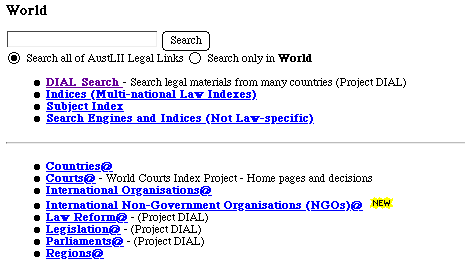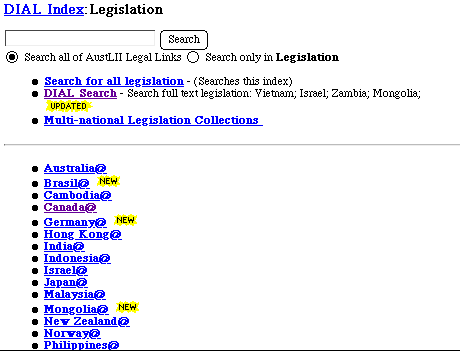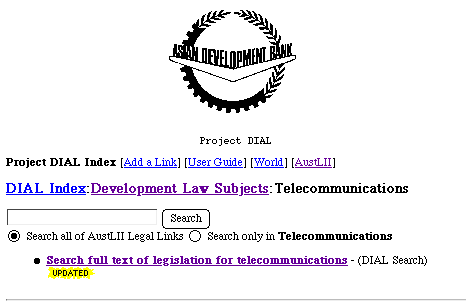[Previous]
[Next]
[Up]
[Title]
5. The index to law on the internet - DIAL Index
AustLII's
Index to Australian Law on the Net, a conventional hypertext index based around
a source/author index approach, was launched in July 1995. The index was
maintained periodically until it reached about 500 entries a year later, at
which point the maintenance of `hand-tooled' web pages, lack of search
capacity, and lack of a subject index became problems which had to be
addressed.
AustLII's first internet indexing software (Chain) was then written, and
released in October 1996. It provided facilities for editing and maintenance of
index entries, and a new user interface with hierarchical browsing,
simultaneous source and subject indexing, full searching of index entries
using the SINO search engine. `Australian Links' was almost immediately the
runner-up in the Australian Society of Indexers inaugural web indexing awards
in 1996. Index entries grew to about 1,500 by mid-1997, of which over 1,000
related to Australian law sites. At this point the Chain indexing software
required redevelopment to satisfy new demands, including those of Project DIAL.
The indexing software was rewritten, with the new software (`Feathers') and
interface released for use in July 1997. It includes major changes: the links
are maintained as an MSQL database; the editing facilities are far more
flexible and provide better support from multiple contributors; customisation
of the appearance of particular sets index pages (eg the Project DIAL pages) is
possible, so that they can appear in a consistent style with text collections
and other resources, but of a different appearance from the rest of the index;
and facilities to target a web spider were added.
The DIAL Index prototype has been constructed as an integral part of AustLII's
index of law on the internet, partly for technical reasons, but also because we
are of the view that what we call a `multi-threaded index' is one of the likely
options for making such an index sustainable at a reasonable cost. The idea is
simply that a number of `stakeholders' collaborate in the construction of a
large internet law index, with each stakeholder concentrating on building one
part of the index. So, for example, Project DIAL concentrates on the creation
of pages of links relating to legislation, and legislation-related resources
such as Parliamentary sites and law reform reports. These pages appear in
AustLII's index clearly identified or `badged' as `Project DIAL Index' pages,
as illustrated in the screen examples below. However, there are many other
pages in the index that have been built for other purposes, and these appear
identified as general `AustLII Legal Links' pages or `badged' as part of some
other specific project (eg on indigenous legal issues).
 The
front page of AustLII's `World' index - a `multi-threaded' approach
The
front page of AustLII's `World' index - a `multi-threaded' approach
For example, from the front page of AustLII's `World' index, a
number of resources are identified as being part of Proejct DIAL, one is the
World Courts Index Project, and the others are just parts of AustLII's general
(`unbadged') world index. Other project-specific threads are to be added, such
as an `Indigenous law' thread as part of the Reconcilaition and Social Justice
Library that AustLII is creating as part of its work with the Council for
Aboriginal Reconciliation.
The benefits of this are, first, that the DIAL Index resources are being
created within an existing and growing international index to legal materials,
where a lot of the hard work in identifying and indexing basic sources of
materials has been and is being done for other purposes, and, second, that
users of the DIAL Index also obtain the benefit of all the other types of legal
indexes (eg to case law or to specialised subject collections) that are being
created as part of this large cooperative indexing project.
The challenge is to enable DIAL index users to gain a clear sense of when they
are within the specific DIAL resources, and when they have moved out into the
broader index, and for there to be ease of navigation between one and the other.
The DIAL Index has five starting points for research:
- DIAL Search - This link to the DIAL Search full text search
facility (discussed below), is intended for users who just want to go direct to
a search of the materials indexed by our targeted web spider, and construct
their own search.
- Development Law Subjects - This is a subject index of matters which
are of particular interest to those drafting legislation in DMCs
(`Privatisation', `Environment' etc), with links to legislation, law reform etc
from around the world dealing with each particular subject. The first stage of
the prototype includes a small number of topics. As an example, the
`Telecommunications' subject page is discussed below. This starting point is
intended to be used by a user who, say, knows they wish to find materials on
telecommunications law, and so goes looking for a subject heading
'Telecommunications'.
- Law Reform - This page links to multi-national and national sources
of law reform reports.
- Legislation - This page links to multi-national and national
sources of legislation.
- Parliaments - This page links to national Parliaments, an
important source of legislative information.
The last three headings are
intended for those users who wish to browse the range of resources (from every
country, or from a particular country or group of countries) of particular
interest to draftspeople, material relating to 'Legislation', 'Law Reform', and
'Parliaments'. The top half of each of those pages lists general resources, and
the bottom half will list country-specific resources for each category (best
seen from the Legislation page). So a user who approaches the DIAL Index
thinking 'I wonder if there is UK legislation available on the web?' 'Can I get
Australian Law Reform Commission Reports on the web?' or 'Does the Portuguese
Parliament have a web site where I might find material discussing this
problem?' will go to those pages.
The end result is intended to be a very extensive set of links and searches on
each subject matter, which gives users access to a wide range of comparable
legislative resources in many countries.
 The
opening page of DIAL Index
The
opening page of DIAL Index
The index of links can be searched from a search window which appears at the
top of each page of the index (see for example in the screen above). Searches
result in a display of both all of the index categories that include the search
terms, and each specific link in the index that uses the search terms.
Searches can be made using boolean connectors (`and', `or' and `not'),
proximity connectors (eg `w/5 for `within 5 words' or `near' for `within 50
words'). Search terms may be truncated with `*' (eg `bankrupt*').
For example, a search over the index for entries relating to `environmen*' (for
`environment', `environmental' etc, includes the following in its list of
search results:
India
Regulatory Environment: India - description of industrial;
foreign exchange control;
trade; intellectual property; labour; capital market and taxation laws
(on India Economic
and Business Overview - Centre for Monitoring Indian Economy Pvt Ltd)
Indonesia:Legislation
Environmental Legislation - Indonesia - list of environmental
legislation with selected
full texts (on Asia-Pacific Centre for Environmental Law)
...
Singapore:Legislation
Environmental Legislation - Singapore - list of legislation (on
Asia-Pacific Centre for
Environmental Law)
Vietnam:Legislation
Vietnam law documents (Environmental and other laws) - (on
Coomsweb, Australian
National University) (in Vietnamese and English translation)
World:Subject Index:Environment
Asia Pacific Centre for Environmental Law - (Law Faculty,
National University of
Singapore)
Database of Environmental Instruments - major collection of
global and regional
instruments and national legislation few in full text still under
development (on
Asia-Pacific Centre for Environmental Law)
Singapore - Environmental Legislation - list of environmental
legislation (on Asia-Pacific
Centre for Environmental Law)
Teaching Environmental Law - under development (on Asia-Pacific
Centre for
Environmental Law)
Part of the results of a search of the index for `environmen*'
Each of the underlined items is a link to an index category or
a resource elsewhere on the web.
The Legislation, Law Reform and Parliament pages all have a similar format.
They commence with links to multi-national sources of information, and then
provide links to national sources of legislation in alphabetic order of
counties.
Part of the Legislation front page is shown below (down to countries beginning
with `P' that have legislation on the web). The page is headed by links
searching for all legislation references in this index (which may find
incidental references to legislation not on the country pages), by a link to
DIAL Search (where legislation of various countries may be searched), and by a
link to a list of other multi-national legislation resources on the web (eg
Project GLIN at the Library of Congress) and (in some cases) to their search
facilities.
Each link to a named country goes to the legislation page for that country,
which may list multiple locations for legislation from that country, or
separate links to search facilities to search that country's legislation, or
instructions on how to do such searches (as illustrated below by an extract
from the United Kingdom: Legislation page).

Part of the Legislation front page
 Part
of the United Kingdom legislation page
Part
of the United Kingdom legislation page
The Development Law Subjects
The Development Law Subject pages in the index will be the core of the
prototype as it develops further, and where most of the innovative features of
DIAL Index are found. However, they are the last stage or layer of development
of the system. At present there are five example Development Law Pages under
construction in the first stage of the prototype. A list of proposed subject
headings is in the Annexures
The Legislation, Law Reform and Parliament front pages and country pages are
the sources of the legislative `raw material' from which the Development Law
Subject pages are built. Once a legislative, law reform or parliamentary source
is located and indexed (and the best ways of searching or browsing it
determined), then it is also used to add new links relating to that country or
multi-national resource to the Development Law Subject pages.


'Telecommunications' Development Law Subject page
The 'Telecommunications' Development Law Subject page
demonstrates both a wide range of statutory materials available from many
countries (though there are more to be added), and the variety of access
mechanisms that must be used to create maintainable internet law indexes.
The main point of this page is that it allows the user to go directly to
available telecommunications legislation from seven countries (Australia,
Canada, India, New Zealand, South Africa, and the United States), without
having to know (i) which countries may have telecommunications laws on the web
(for example, the Zambian and Israeli legislative collections do not at present
include telecommunications laws) or (ii) the best ways to find the
telecommunications laws within those national collections.
The variety of types of links used on this page, and the reason each has been
used, is as follows:
- The South African, UK and Canadian links go directly to specific statutes.
This is the simplest type of link in the index. It is used where there are no
subject indexes provided to the legislation (if there was, it would be better
to link to the `Telecommunications' entry rather than specific statutes), and
no search engines where embedded searches can be used. In fact, the Canadian
and UK systems have good search engines (which can be accessed from the
legislation pages for those countries) but searches over those systems do not
return URLs for specific searches, so it was not possible to embed searches for
`telecommunications' in our index. We have now found a way around this problem,
and specific searches will be embedded in the next update.
- The US Code (located on Cornell's Legal Information Institute) shows an
intermediate solution, as it takes you to a search screen which allows searches
over the relevant title of the US Code. As above, specific searches could not
then be embedded in our index.
- The Australian entry is an embedded search over the titles of all
available Australian legislation for `telecommunications'. It finds 133 pieces
of legislation. The AustLII site (where the Australian legislation is located)
allows such searches to be embedded, whereas most other systems do not. In this
case the choice was made to search only over the titles of the legislation, not
the full text, as that gives a precise list of telecommunications Acts and
Regulations in Australia, not just those that mention `telecommunications'.
- The Indian entry is the only other national collection that allows an
embedded search such as this. However, the search engine on the Lok Sabha site
only allows a search over the full text of Acts, so Acts which simply mention
telecommunications are included.
- The 'DIAL Search' entry is an embedded search for the term
`telecommunications' over all of the legislation from around the world that has
been indexed by the web spider[15]. It
displays the results ranked in terms of their likely relevance to the search
request (for example, items that use the term `telecommunications' frequently
will appear before those that only use the term in passing, with adjustments
made for the size of the document etc). The DIAL Search is effective in that it
ranks first in its list the `Post and Telecommunication' subject index page for
Vietnamese legislation, then next a specific piece of Vietnamese legislation
issued by the telecommunications authority. Further down in the ranking there
some minor Zambian references (a list of 1994 Acts including telecommunications
legislation) and Mongolian legislation referring in passing to
telecommunications. All of these items are found without any intellectual
indexing.
- The Vietnamese `Post and Telecommunication' subject index page is an usual
example of a subject index to legislation, and would justify a separate entry
in the DIAL Index `Telecommunications' page. -However, the interesting thing
is that DIAL Search found it and ranked at the top of the search list anyway,
which illustrate one of the principles of our approach, the value of
[15] For reasons explained below, this
currently includes legislation from Canada (Nova Scotia); China; India; Israel;
Mongolia; Portugal; Vietnam; and Zambia, plus a very large number of
constitutions, documents from the Asian Development Bank, and all decisions
published on the web by the House of Lords. Legislation from other countries is
being added.
alternative routes (or redundancy).
[Previous]
[Next]
[Up]
[Title]




 Part
of the United Kingdom legislation page
Part
of the United Kingdom legislation page
